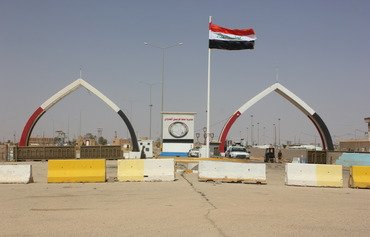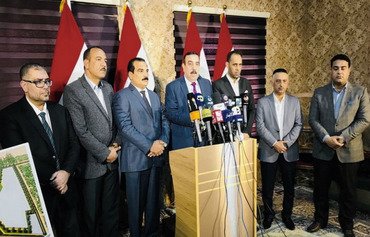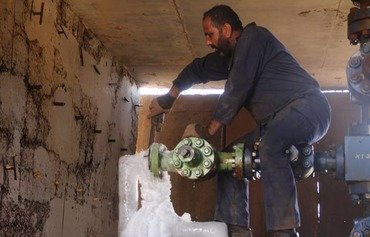As Anbar's local authority strives to attract investments, it is setting its sights on a new deal to construct a smart city to reinvigorate the economy in Iraq's westernmost province.
Anbar officials on December 11th signed a memorandum of understanding with several international investment companies to build an integrated smart city on the banks of Lake Habbaniyah.
This project is the first of its kind since the "Islamic State of Iraq and Syria" (ISIS) was expelled from all Anbar cities a year ago.
The Habbaniyah smart city project marks "the launch of our investment efforts" post-liberation, said Hameed Ahmed al-Hashim, chairman of the Anbar provincial council investment committee.
![The iron bridge in the western Anbar city of Heet, which was destroyed by the 'Islamic State of Iraq and Syria' in 2014, has been rebuilt over the past year. [Photo courtesy of the Reconstruction Fund for Areas Affected by Terroristic Operations]](/cnmi_di/images/2019/01/04/16032-Anbar-Heet-bridge-600_384.jpg)
The iron bridge in the western Anbar city of Heet, which was destroyed by the 'Islamic State of Iraq and Syria' in 2014, has been rebuilt over the past year. [Photo courtesy of the Reconstruction Fund for Areas Affected by Terroristic Operations]
"We signed a memorandum of understanding with the South Korean company (TRAC) and other American companies to support this massive project," he told Diyaruna.
The new city will be built "based on the latest architectural designs on the banks of Lake Habbaniyah in eastern Anbar", said al-Hashim.
It will include residential, touristic, educational, medical and sports facilities in addition to a railway that links the city with the capital Baghdad in order to facilitate travel between the two cities.
The investors, he said, will build local "environmentally friendly factories" to provide raw material needed for building the smart city.
Al-Hashim said he hopes the project will "usher in large-scale investments", adding: "Since we recovered our cities from ISIS, we have taken big steps towards reconstruction and have executed several projects to maintain stability."
The projects focused on infrastructure with the reopening of services agencies and the rehabilitation of roads, bridges, electricity and water networks, he said.
"Our plans for [this] year include building a large hospital in Ramadi with a 600-bed capacity, as well as rebuilding 86 bridges on the international road that stretches to the Jordan-Syria border, amongst other projects," he said.
Attracting investors to Anbar
Anbar's local government has more than 64 investment opportunities across several sectors, said Anbar provincial council member Taha Abdul-Ghani, who heads the council's construction and services committee.
"These opportunities were presented at the Anbar reconstruction conference that was held on October 17th in the Jordanian capital, Amman," he told Diyaruna.
"We are doing everything in our power to incentivise investors to come to our province," he said, stressing that Anbar is today "safe and a fertile environment for investment".
Anbar has many attractions for investors such as a wide geographical area that is rich with natural resources and raw materials, said Abdul-Ghani, adding that attracting large investments "is how we can achieve development and stability".
The Habbaniyah smart city, which was planned before ISIS's incursion, is a "successful start and a big step forward", he said.
It will create jobs "for thousands of unemployed people in the province and will also strengthen the economy and support tourism and development", he added.
The smart city will be built on 16,000 acres with an overall investment value of around $9 billion, according to Abdul Ghani.
'Lifting cities from under the rubble'
The Habbaniyah smart city project will be implemented in five stages over the next decade, al-Khalidiya district municipal council head Ali Daoud told Diyaruna.
The first stage of the project will begin in March with the construction of a large hotel with 36 floors, as well as hotel apartments and other touristic facilities, he said.
The other stages of the project will involve residential complexes including 10,000 apartments and villas and a hospital with a capacity of 300 beds, he said.
This is in addition to universities, schools, a sports and recreational city and other service facilities, he said.
The al-Khalidiya administration is restoring most of the municipal projects that were halted during the war, he said, adding that it will soon launch a new bundle of reconstruction projects, including the development of the main road in the district, side roads and sanitation services.
"Our war on terrorism is over and now we have to lift our cities from under the rubble of war, and we will not stop until we achieve a full renaissance," he said.

![Anbar officials on December 11th signed a memorandum of understanding with a South Korean company and other American companies to build a smart city on the banks of Lake Habbaniyah. [Photo courtesy of Anbar province media office]](/cnmi_di/images/2019/01/04/16033-Iraq-Anbar-agreement-600_384.jpg)






